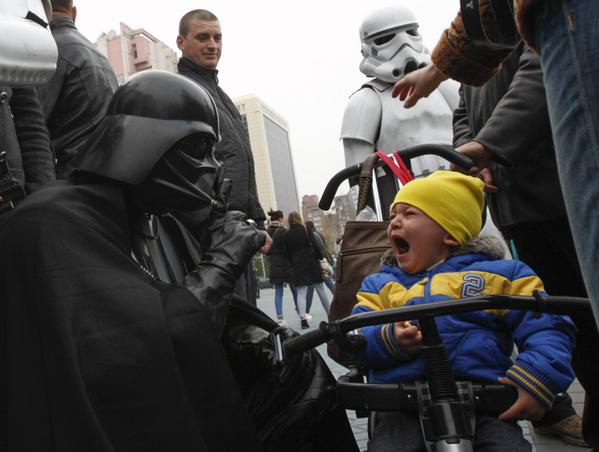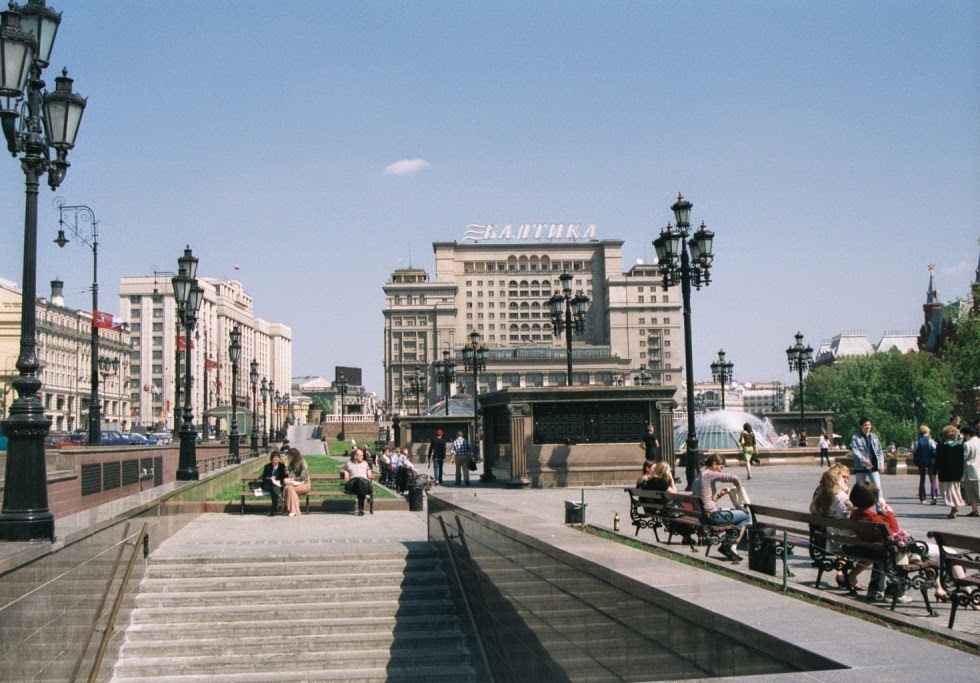...was the collapse of the Soviet Union. Putin said this once apparently. No he didn't you idiots (and I don't mean you, readers!). What he actually said was the collapse of the Soviet Union was the "greatest geopolitical tragedy of the 20th century". The omission of "geopolitcal" alters the meaning and context of what he said; in this context, the word "greatest" means "largest in geographic area".
It's a line frequently trotted out in the Western media and top US politicians, more so since the Ukraine crisis has unfolded. The Ukrainian Prime Minister Arseniy Yatsenyuk even uttered this tripe the other day.
We certainly seemed to have returned to a Cold War footing - especially on the propaganda front. Back in the eighties, I remember Mikhail Gorbachev making a speech about Afghanistan which was taken out of context and widely misquoted. He said something along the lines of "imperialism has turned Afghanistan into a bleeding wound"; he was laying the blame squarely at the door of the Americans and their support of the Mujhadeen in opposing the Soviet occupation. But this was shortened, taken out of context and presented as an admission that "Afghanistan has become a bleeding wound". It was not what the Soviets wanted either the world or it's own people to believe was happening in Afghanistan, and it completely changed the meaning of what he had said. Even so, this was seen as a frank admission that things were not quite as they seemed in Afghanistan or a tacit acknowledgement that the Soviet Union was mired in its own "Vietnam". After all, "glasnost" - openness - was the policy of the day.
Similarly, Putin's statement is often misused. It's interpreted that he somehow bemoans the loss of the Soviet Empire, the loss of Russia's power & status in the world, and his current actions can be explained by his desire to restore Soviet borders for the Russian federation, or to recreate the Soviet Union, or even to return to communism. Of course, his KGB background is often mentioned when propagating this nonsense.
The collapse of the Soviet Union in 1991 and the separation of the territory of 15 Soviet republics into newly independent countries was accompanied by economic hardship, hyperinflation, collapse of social protection, rise in organised crime, unemployment, brain drain, and complete economic dislocation (the Soviet Union was a centrally planned economy with all sectors, infrastructure and transport links very much interconnected and interrelated. The Soviet Union's vast geographically distance economy was controlled, albeit imperfectly, by banks of supercomputers whirring away on Prospekt Marx in downtown Moscow - home to the state planning body Gosplan (the building now houses the State Duma a Russia's parliament).
The system wasn't working effectively in many areas, but the breakup of the Soviet Union destroyed the planning system and fractured industry and infrastructure - eg how do you run a railway if your trains have been commandeered by newly independent countries, who owns the tracks, who owns the trains, who marshals the train service?
The period was also accompanied by considerable political upheaval as new institutions state power structures had to be developed very rapidly and often from scratch: legislature, executive, parliament, political parties, legal framework, other levers of power and democratic institutions- simultaneously across the vast territory of the former USSR. Yelstin's power struggle with the Russian parliament which ended with the army shelling the White House - the building housing the Russian Parliament - is a prime example of the consequences of the the political collapse: political stalemate resolved in violent and fatal fashion. But in some former republics, the power struggles were more violent in character, with some verging on civil war. Edvard Schevardnadze, first President of Georgia, felt the harsh reality of the geopolitical catastrophe, following the collapse of the USSR, when he was holed up in a bunker during a Georgia's civil war in the early nineties - As the former foreign secretary of the second most powerful country in the world and, at the time, President of Georgia, he must have thought "where did it all go wrong?" as the shells rained down around him in that bunker.
I think that in Putin's view, the geopolitical catastrophe is a historical fact - it has occurred, it can't be undone. It may be possible or expedient even to right some "historical wrongs", but I don't think there is any appetite, desire, motivation to restore the borders of the Soviet Union. Politically, he has presented himself as the only alternative to the wild Nineties - an antidote to the Yeltsin era, and has been successful in restoring the prestige (domestically at least), stability and power of the Russian state. The collapse of the USSR, influences his approach to building power structures in order to control the levers of the economy and the state; he has resurrected many Soviet symbols, including the Soviet National Anthem (same music - different words), but restoring the USSR is not on his radar. For example, Belarus - the bankrupt, corrupt, dictatorship of the former Soviet republic Belorussia would love to join Russia; it has courted Russia for many years, and Putin/Russia has consistently rejected their advances. In the Baltic countries, Latvia and Lithuania in particular, the sizable Russian speaking population has been discriminated against, repressed, deprived of rights for 20 odd years without any attempt by the Russian state to annex part of that territory on the pretext of protecting the rights of ethnic Russians.
The thing is, US politicians should know all this. Fiona Hill of the US Brookings Institution has often challenged this red herring in her books and lectures (Putin's view that the Soviet Union collapse was a tragedy). Both Fiona and this respected institution have been advising the US Government at the highest levels for years on Russian affairs, so it is inconceivable that US politicians don't know that they are spouting disingenuous crap.









 I had long wanted a Red Army belt buckle, and could have bought one from any one of the many black marketeers on the streets of Moscow and Leningrad on a number of occasions; but I had always passed up those opportunities on the basis that it was illegal to export them from the Soviet Union. I had also been told that the buckles were made from gun metal and would therefore set off the metal detectors at the airport - so you couldn't wear one as a belt and conceal the buckle with your jumper. After buying some Russian tea which came in a metal tea caddy, I hit upon the idea of emptying the tea into a plastic bag and replacing the contents of the caddy with a belt buckle - brilliant! I could now purchase my long coveted Red Army belt buckle; hell, why not go daft and get a Soviet Navy belt as well?
I had long wanted a Red Army belt buckle, and could have bought one from any one of the many black marketeers on the streets of Moscow and Leningrad on a number of occasions; but I had always passed up those opportunities on the basis that it was illegal to export them from the Soviet Union. I had also been told that the buckles were made from gun metal and would therefore set off the metal detectors at the airport - so you couldn't wear one as a belt and conceal the buckle with your jumper. After buying some Russian tea which came in a metal tea caddy, I hit upon the idea of emptying the tea into a plastic bag and replacing the contents of the caddy with a belt buckle - brilliant! I could now purchase my long coveted Red Army belt buckle; hell, why not go daft and get a Soviet Navy belt as well? 





